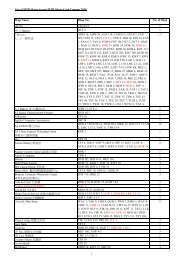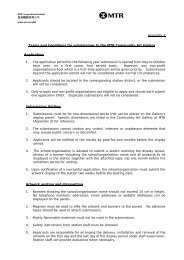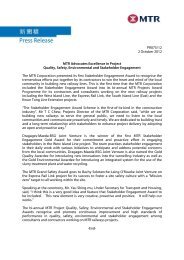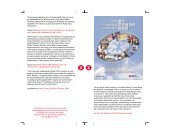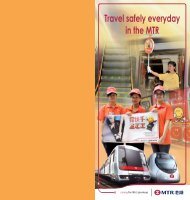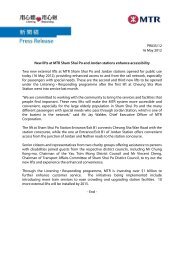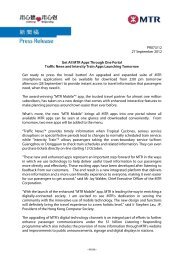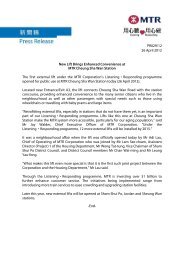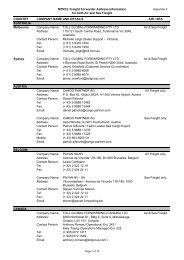sustainabilityreport2003.pdf
sustainabilityreport2003.pdf
sustainabilityreport2003.pdf
Create successful ePaper yourself
Turn your PDF publications into a flip-book with our unique Google optimized e-Paper software.
Case Study Corporate Evolution Towards Sustainability<br />
In last year’s report, we revisited the rugby ball as a visual representation of corporate<br />
sustainability. We consider that MTR’s achievements during 2003 have led to a slight<br />
expansion of the football in the social and environmental directions, as well as slight expansion<br />
in the economic direction.<br />
Environmental<br />
Economic<br />
2001<br />
Social<br />
Environmental<br />
4.7 SUSTAINABILITY ACCOUNTING<br />
Economic<br />
2002<br />
Social<br />
Environmental<br />
Economic<br />
During 2003 and early 2004, MTR undertook a Sustainability Accounting study<br />
to estimate the costs of managing priority social responsibility and<br />
environmental business risks for the operating railway and MTR’s support<br />
divisions (1) for calendar year 2003. It is MTR’s intent to estimate these costs<br />
and benefits on an annual basis to provide a broad indication of how these<br />
costs change as the Corporation evolves into new business areas and<br />
geographic locations and invests in new railways.<br />
At an early stage, it was agreed internally that the study would not be<br />
sufficiently accurate to allow its results to be used for management purposes.<br />
As such, the study was primarily intended to reinforce MTR’s commitment to<br />
transparency and openness to its stakeholders. In addition, many<br />
organisations, especially Hong Kong corporates and urban rail operators world<br />
wide, regard MTR as a role model and are keen to understand the financial<br />
costs of incorporating sustainability as a means of enhancing long-term<br />
shareholder value.<br />
The study was undertaken by an ad hoc MTR Working Group with discussions<br />
with senior management. The framework for the study was based on MTR’s<br />
priority business risks and on the Corporate Sustainability Assessment<br />
questionnaire developed by Sustainable Asset Management (2) . MTR’s<br />
Activity Based Costing (ABC) System was used to provide cost data,<br />
comprising staff costs and departmental operating expenses, for the study and<br />
already incorporates some costs that are inherent in the activities reported<br />
below. Cost data from the ABC system does not include capitalised<br />
activities (eg: capital works, projects work and extension works). The<br />
majority of costs incurred by the Project and Property Divisions are<br />
capitalised costs and as such, these Divisions were not included in the study.<br />
( 1) Legal & Procurement, Headquarters, Finance and Human Resources & Administration.<br />
( 2) SAM is the research provider for the Dow Jones Sustainability Index.<br />
MTR CORPORATION SUSTAINABILITY REPORT 2003<br />
20<br />
2003<br />
Social



